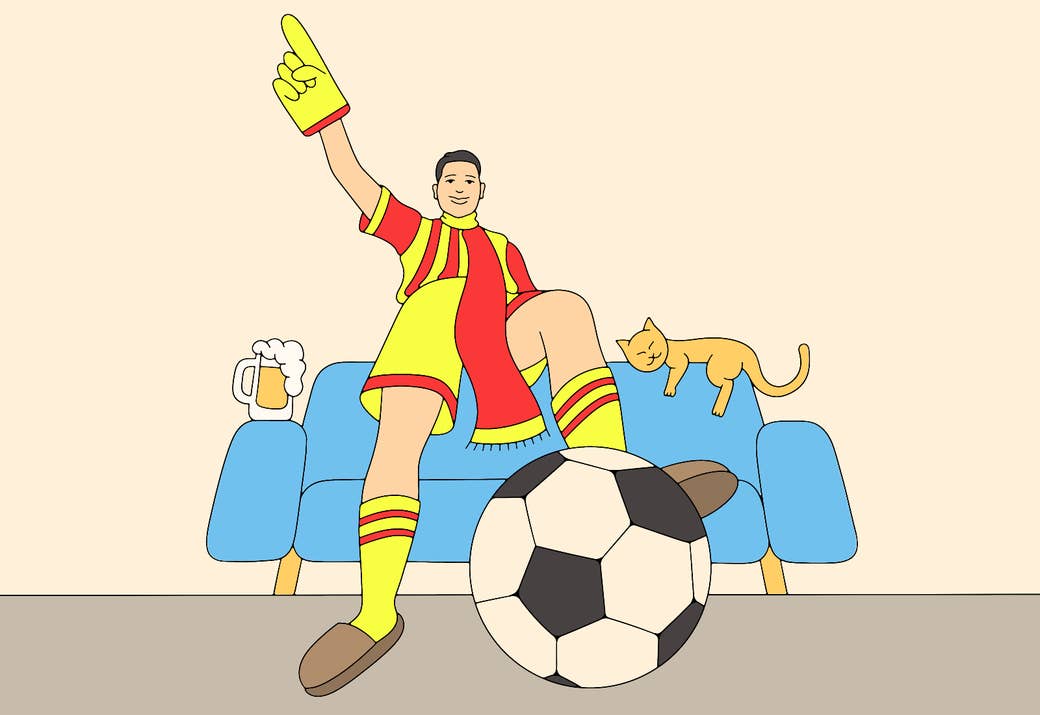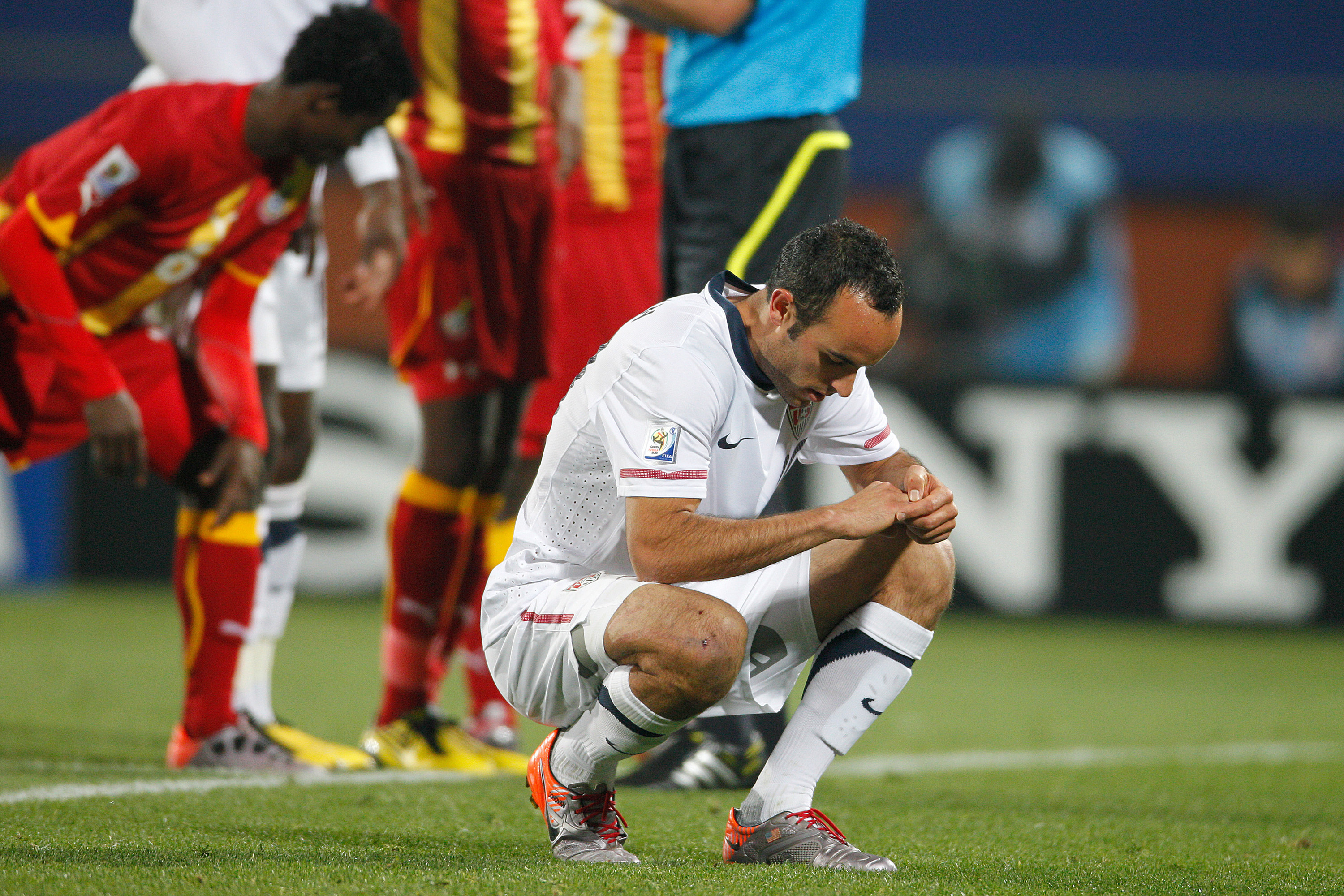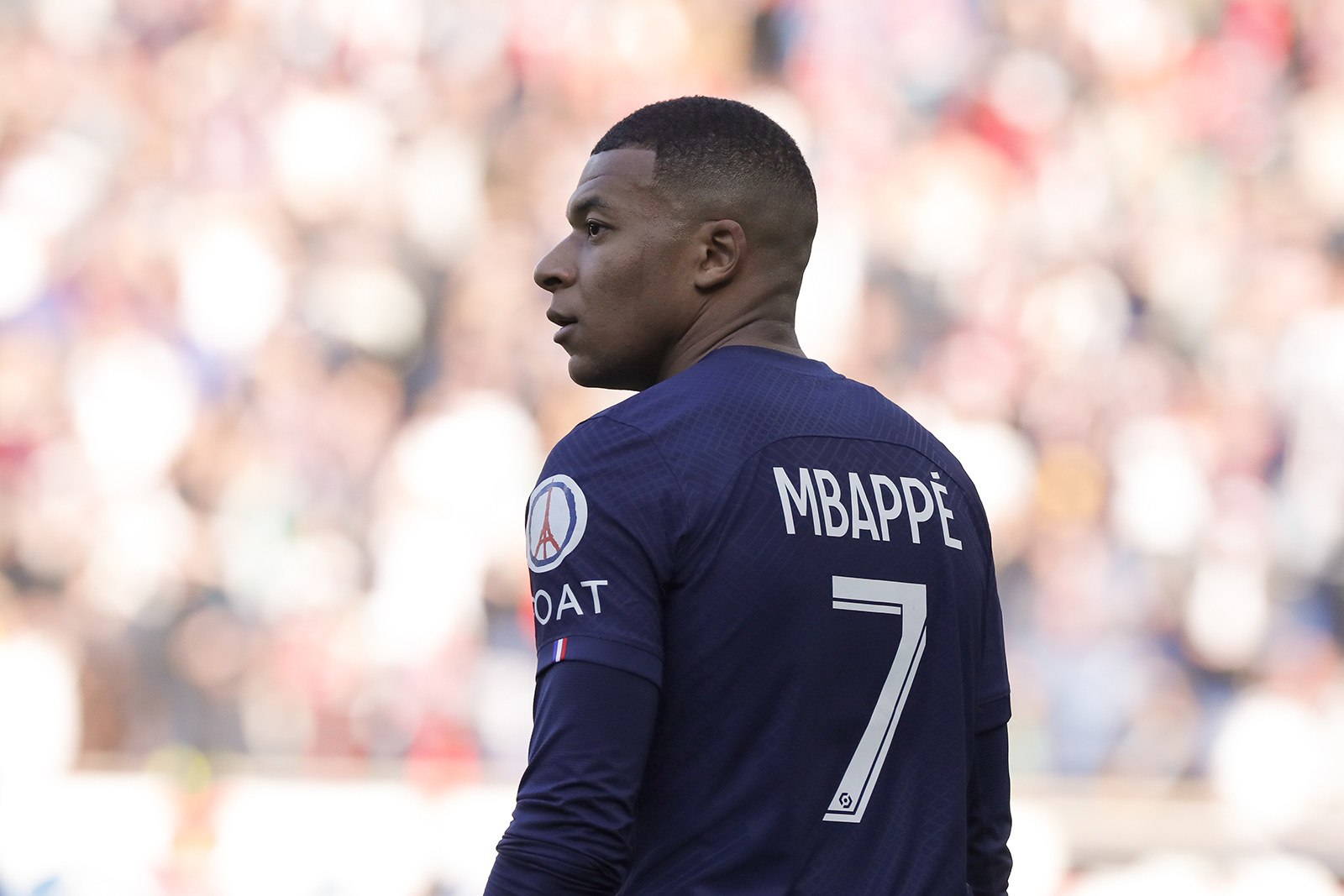
Growing up as a boy in the US, I had no interest in soccer.
There was no glory there. Being an American men’s soccer player, I learned early on, meant being a punching bag in the world’s most popular sports tournament and invisible in the years in between. I rarely saw soccer highlights on SportsCenter.
I had heard the excuses for our incompetence. It isn’t because we can’t produce elite soccer talent. The US won the first women’s World Cup in 1991, then three more since, while never finishing below third place. At the first men’s World Cup in 1930, the US won its opening game against Belgium, then defeated Paraguay 3–0, with all three goals scored by Bert Patenaude, making the Massachusetts-born forward the first person in tournament history to record a hat trick, before the team ultimately fell in the semifinals to Argentina. But in the decades that followed — as baseball held steady as the national pastime, basketball gained mainstream appeal, and football began its ascent toward domestic dominance — our men’s team spiraled into irrelevance, failing to qualify for 40 years straight and never advancing past the quarterfinals.
The reason our men’s team has never reached the sport’s highest echelon, I deduced from my earliest years as a sports fan, was because American men didn’t care about soccer. What else could explain the disorienting dissonance? America was richer than everybody else, cared deeply about athletic competition, and won the most medals at each Olympics. Surely we would prove superior at men’s soccer, too, if only our most physically adept boys weren’t dreaming of becoming running backs and shooting guards.
From what I understood, soccer was too low-scoring to satisfy our cravings for blunt excess, and required too much finesse for our fetishization of toughness. The European and South American players who exaggerated falls and injuries embodied the softness of socialist policies that punished hard workers while rewarding shortcutters. A country mythologized on grit and merit produced people like Ronnie Lott, the NFL player who asked to have his mangled pinky chopped off so he could stay in the game; Willis Reed, who hobbled on a torn thigh muscle to inspire his team to win the 1970 NBA title; and Mickey Mantle, who smashed home runs while hungover. For a nation rooted in primal might and arrogant isolationism, ineptitude at men’s soccer wasn’t something to be ashamed of but a badge affirming our exceptionalism.
I bought into this idea as well. My introduction to soccer came in first grade, when I joined my school team. While I excelled in baseball and basketball, I was useless at soccer. I couldn’t seem to kick the ball straight or with any respectable force. In three years of grade school competition, I scored a grand total of one goal, an event so monumental that my mom rewarded me with a Lego set after the game. During my final year playing soccer, in third grade, I asked to switch to goalkeeper, where I figured my hand-eye coordination could finally be put to use. We lost 3–1. I never played goalkeeper again, and once the season ended, my days of competitive soccer were over.
I preferred to spend my autumn playing the sport I loved most, American football, a game of conquest through violent force, knocking your opponent backward to seize their territory until you reach the other side to earn your manifestly destined touchdown. As my mom and I moved around California over the years and I repeatedly found myself as the new kid at an unfamiliar school, my athletic skills earned me immediate friendships with the most respected boys in class. In high school, my feats on the football field got me featured in newspapers and lured college recruiters. Even though we lost most of our games, our stands were filled with classmates chanting our names.
Soccer was far from my mind, though rarely far from sight. The first-generation immigrant Mexican kids at my high school kicked around a soccer ball at lunch. One of my white college roommates hung a Manchester United banner above his bed. In 2009, ESPN signed a broadcast deal for the rights to the English Premier League and started promoting the games it was featuring. When I was in grad school in New York City in 2010, I crammed into a bar in Midtown Manhattan to watch the US men’s soccer team lose to Ghana, ending a promising (by American standards) World Cup run. As more research revealed the brain trauma football causes, fewer parents were letting their kids play, and I wondered if the sort of boys who used to dream of playing running back now spent their autumns trying to be like Lionel Messi.

But the sport wasn’t yet resonating with me. The US team was filled mostly with white players, making it hard for me to support them over teams composed of players who looked more like me and my brown friends. I had no fond memories of the game, nor any emotional investments in a professional team. Like learning a new language, picking up a new sport gets harder with age. Immersion is critical.
The first turning point for me came in 2018, when my friend Alex invited me to his bachelor party in Paris. He scheduled the week of revelry to align with the World Cup. Alex played soccer at his high school in Massachusetts, most of the groomsmen were teammates, two others were British — among the group, I was alone in my indifference to the sport. I assimilated as nonchalantly as I could. I casually tapped my foot against the ball we were kicking around at a park before dinner one afternoon. As we watched games at bars, I uttered observations like “dang, nice cross” and “ooh, what a strike,” as if I’d seen a million of them. As France’s team advanced through the tournament, I began referring to their players with a breezy familiarity that hid the fact that I had never heard the names Pogba or Mbappé before that week. And when France won, I celebrated with an authentic joy only possible when you have real stakes in the game. The team had delivered us a week of collective delight. For the first time, I felt an emotional connection to a soccer team.
Another turning point came in the summer of 2021, when I went on a road trip across Oaxaca, Mexico, with my friend Ryan, a longtime fan of Arsenal Football Club who still plays pickup soccer. Now that I was becoming a casual fan, I picked his brain as we made our way from the valley to the coast. Halfway through the journey, we spent a day in San José del Pacifico, a town of 600 residents perched on the edge of the Sierra Madre del Sur mountain. The town’s known for its psychedelic mushrooms, and hordes of European tourists wandered the steep roads on blissed-out trips. That afternoon, we ended up chatting with our Airbnb hosts, whose kids were playing soccer in our building’s courtyard. Ryan had spotted the kids kicking the ball around, joined them, and in doing so drew the hospitality of their fathers, who noted that most guests usually keep to themselves in their rooms. We spent hours slipping mezcal with the family, learning about the town as the soccer ball bounced across the dirt.
Soccer decentralized America. It served as a balm for my increasing disillusionment with my country.
The more I paid attention to the world’s most popular sport, the more I saw it all around me, and the more I realized how deeply I had been programmed to ignore it. Soccer came to represent a wider view of the world than the one I’d grown up with. Soccer decentralized America. It served as a balm for my increasing disillusionment with my country.
This summer, I traveled to Europe hoping to get my mind off the barrage of bad news in the US. A few weeks into my trip, an old friend I’d started dating, Tamerra, joined me. She had played soccer in high school, like Alex and Ryan, and continued on in college. While in Paris, she got us tickets to a Paris Saint-Germain match, a team featuring stars like the Argentinian Messi, the Brazilian Neymar, the Spain-born son of Moroccan immigrants Achraf Hakimi, and the France-born Kylian Mbappé, whose roots trace to Cameroon and Algeria. The stands around us boasted a cosmopolitan mix of Black, Arab, and white people cheering on a team made up mostly of players whose lineage traced to formerly colonized nations in the Global South. I felt overcome by a sense of solidarity.

The Europeans had introduced soccer across its colonies, and now the descendants of those subjects starred in the continent’s top leagues and on the national teams of their ancestors’ former colonizers. Soccer reflects the migration patterns of a shrinking world ever more interconnected, a global community I yearned to be a part of, an ecosystem beyond America’s borders where the weight of my country feels lighter, distant, irrelevant.
Fortunately for me, I’m now part of a wave of American latecomers jumping on the bandwagon. Over the last year, US television stations have invested heavily in the rights to broadcast European soccer to an American audience. In November 2021, NBC signed a $2.7 billion deal to extend its television rights to English Premier League games through 2028, doubling the price of the previous contract. In August, Paramount Global signed a $1.5 billion deal to extend its rights to Champions League games for another six years, more than doubling its previous per-season cost. A 2019 Gallup poll showed nearly a third of respondents considered themselves soccer fans, higher than any previous mark and seven times higher than in 1990. Soccer television ratings continue to rise across the board, including in the men’s and women’s US leagues, Major League Soccer, and the National Women’s Soccer League. Last week’s World Cup quarterfinals games drew the largest American audience on record for that stage of the tournament.
I’ve scheduled my days around watching every game. I’ve picked my favorite European club teams to support and identified my favorite players. I’ve purchased two soccer jerseys, attended four live professional soccer games, and developed opinions on tactics. This was the year I fell in love with a sport I ignored for most of my life, catching on just in time to enjoy a World Cup that even longtime soccer fans have deemed epic.
For Thanksgiving, I spent the week in Boston with my teenage half-sisters who grew up in Beirut and moved to America in 2020. They knew little about the sports I’d grown up watching but followed soccer intensely. We watched the World Cup games together, supporting France, the country that once colonized our Lebanese ancestors. When I told them I was also cheering for the US, they chuckled.
“But why?” one said. “That’s so embarrassing. They’re so bad.”
“It’s my country!” I said.
“America already has everything,” another said. “You don’t need to be good at soccer, too.” ●
